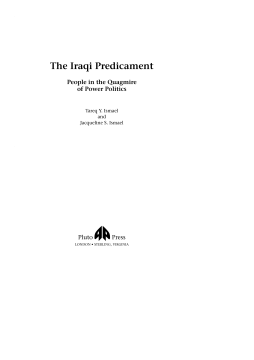
Additional Information
Book Details
Abstract
On February 15, 2003, over 6 million people around the world marched in protest against a threatened war on Iraq. In the light of these remarkable events, and the conflict that followed, it is now more important than ever to properly assess Iraq's role in world politics.
This book provides a history of Iraq, an assessment of its position in the broader political landscape, and a moving account of the day-to-day reality experienced by the Iraqi people. The authors look at Iraq's -- and Saddam Hussein's -- relations and influence in the region of the greater Middle East. They examine the role of the UN, sanctions and warfare, explaining the impact this has had on Iraq's civil population and related humanitarian questions.
They assess American policy towards Iraq and how this has changed since September 11, setting it within the broader context of America's involvement in the Middle East. Finally, they look at social policy within Iraq, explaining how the internal welfare system has collapsed since the Gulf War, and examining the continuing effects of depleted uranium.
'Every chapter is well researched and detailed'
Michael Douglas, Bookmarks review
'In a splendid understatement, the title reflects the troublesome history of this ancient country'
Noel Reid, Tyrone Times
Table of Contents
| Section Title | Page | Action | Price |
|---|---|---|---|
| Contents | 4 | ||
| 1 Introduction: The International Setting | 8 | ||
| 2 The Iraq Question in Arab Politics | 16 | ||
| Arab Popular Opinion | 18 | ||
| Arab Regional Politics | 24 | ||
| Arab Regional Politics and the Iraq Question | 28 | ||
| 3 The US, September 11 and the Invasion of Iraq | 46 | ||
| The Development of American Policy Towards the Middle East | 49 | ||
| Understanding Dollar Hegemony | 60 | ||
| Background to the Presidency of George W. Bush and September 11 | 63 | ||
| The Aftermath of September 11 | 64 | ||
| The Prism of Media Power Discourse | 67 | ||
| Prelude to Invasion | 75 | ||
| Invasion and the Aftermath | 82 | ||
| Conclusion | 94 | ||
| 4 UN Sanctions: Tools of Domination and Oppression | 97 | ||
| Tools of Coercion | 98 | ||
| Tools of Domination and Oppression | 102 | ||
| Weapons Inspection | 102 | ||
| Humanitarian Aid | 108 | ||
| Aid without Inspections | 115 | ||
| 5 Social Deconstruction: Social Development under Siege ( co- authored with Shereen T. Ismael) | 133 | ||
| Social Development before the 1990 Π91 Gulf War | 133 | ||
| Social De- development after the 1990 Π91 Gulf War | 137 | ||
| Assessments of the Humanitarian Impact of Sanctions on Iraq | 143 | ||
| Depleted Uranium in Iraq | 158 | ||
| People in the Quagmire: ‚– a minor point in the history of– war™ | 160 | ||
| The Invasion Attacks on Infrastructures | 162 | ||
| Targeting Ambulances and Medical Infrastructure | 164 | ||
| The Plight of Hospitals under US Occupation | 165 | ||
| Gallantry of Selfless Iraqi Health Workers | 168 | ||
| The Tragedy of Iraqis Continues | 171 | ||
| Conclusion | 172 | ||
| 6 Russia and the Question of Iraq | 174 | ||
| Soviet Background | 175 | ||
| Post- Soviet Russia and Iraq | 181 | ||
| Notes | 217 | ||
| Bibliography | 256 | ||
| Index | 267 |
